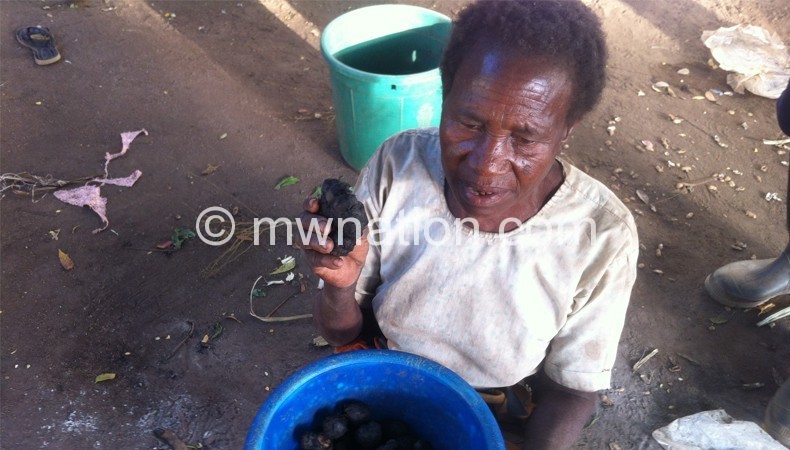FLOOD VICTIMS STARVING IN CAMPS
Thousands of flood victims in Nsanje and Chikwawa are stranded, surviving without proper food and safe water as local politics and government delays continue to derail their relocation to upland areas, The Nation can reveal.
So disturbing are scenes in some camps that reports of unmarried women and young girls engaging in illicit sexual relations are rife and disheartening.

going, nyika
The Nation visited three camps in Nsanje—Bangula, Tengani and Mchere. In all these camps, provision of relief items stopped two months ago and victims, who lost everything during the raging floods, have been left to fend for themselves.
Currently, all the 18 camps in Nsanje are still functional, according to the district’s director of administration, Redgson Nkolombwe.
At Mchere Camp, which shelters almost 114 families evacuated from Traditional Authority (T/A) Nyachikadza’s area, the victims are surviving on water lilies (nyika) because their food supplies run out and also because they literally do not have any income generating activity to buy the maize being sold just a stone’s throw away at Mbenje Market.
The energetic ones, especially men, are able to do piece works (ganyu) to, at least, earn something.
A visibly pale and weak elderly woman at the camp, Esiteni Nyelezelani, cried to The Nation, saying she is tired of water lilies and she wants nsima if she is to live in the next two weeks.
Nyelezelani and 756 other families were evacuated from T/A Nyachikadza area in the district after their entire village was submerged by the raging floods that hit 15 of the country’s 28 districts.
After they were moved from classrooms at Mchere Primary School where they had put up since evacuation, only 114 families managed to get tents, the rest, according to a representative from group village head (GVH) Tchapo, were told to rent houses.
The area they are staying in is Mbenje, a busy trading centre developed through one of government’s rural infrastructural programmes.
There are video showrooms, bottle stores and various shops—something Tchapo said is luring widows, unmarried women and girls into prostitution.
At the camp, which has 10 toilets, each family has a tent. On average, most families here have up to nine children. Meaning, the question of congestion is beyond comprehension.
“We do not want to be here. And neither do we want to get back to where we used to stay—we will just use that land for cultivation. We have learnt our lesson and none want to go back. What we want is for government to give us land where we can relocate and build our lives together. The more we stay here, the more we suffer. We want to be relocated to an upland area,” said the representative of GVH Tchapo.
As part of the Nsanje relocation strategy, Nkolombwe said the council is working with affected T/As to negotiate with fellow chiefs and find land for their displaced people. He added they are working tirelessly to ensure that all flood victims are relocated by end July.
However, their relocation strategy is facing a serious challenge of power relations bordering on land distribution and sharing.
For instance, T/As Chimombo and Ndawera, according to Nkolombwe, offered land for displaced locals from T/A Nyachikadza to relocate, but attached a condition.
“The condition was that those from Nyachikadza should also surrender part of their original land to those that will share them land in T/A Chimombo and Ndawera,” he said, something that locals from Nyachikadza confirmed.
However, locals from Nyachikadza rejected the land exchange strategy, arguing, their land is already small and they could not share it with others.
This far, locals in Nyachikadza wrote the council asking government to buy them land—something Nkolombwe said will be difficult at this time because government does not have such plans.
In an interview with The Nation on Sunday, spokesperson for the Department of Disaster and Management Affairs (Dodma), Jeremiah Mphande, said his office is yet to get an official report from Nsanje on the issue.
Last Thursday, President Peter Mutharika launched Malawi’s Post-Disaster Needs Assessment (PDNA), which revealed that the country will need about K215 billion to fully recover and reconstruct from the damage caused by the January 2015 floods.
The report said the unprecedented floods that hit Malawi in January 2015 affected 1.1 million people, displaced 230 000 and killed 106 people in the process.





